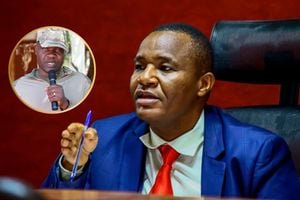
President William Ruto addresses the nation during the 60th Mashujaa Day celebrations at Kericho Green Stadium.
For more than a decade, compliance with the constitution has largely taken the form of expedient approximation, whereby powerful interest groups struck convenient, often tacit political bargains within a superficial conceptual vicinity of explicit constitutional decrees.
The ultimate effect of such negotiations has been, of course, that more often than not, the constitution has been disingenuously interpreted to permit the forbidden and neglect what it commands.
Thus, the political sector appropriated an unaccountable jurisdiction to determine the direction and pace of constitutional implementation and acquired an equally inscrutable propensity to condone gross material failure to effectively lead the national transition into a new dispensation.
Instead, it has publicly persisted in abetting wholesale transplantation, impermissible survival and dismaying continuity of reprehensible institutions which thrived with offensive exuberance under the old order.
On one hand, the constituency development framework is obdurate, defying consistent determinations of flagrant unconstitutionality, whereas devolution, the aspiration which at least formally subsumed and was destined to extinguish it, struggles. On the other hand, the constitutional injunction of parliament to devise progressive means of actualising gender parity in representation remains substantially unfulfilled three parliaments after its promulgation, despite being so fundamental that the very life of any Parliament is predicated on its expeditious realisation.
Distinctive political organisation
The insolent impunity of our political sector extends beyond brazen defiance of explicit constitutional edicts, and manifests more insidiously. The ideological fluidity in our political parties, which simultaneously conduces autocratic proclivities — including the burgeoning of personal lifelong ownership of entire movements — and effervescent orgies of spectacularly promiscuous political permutations and combinations, on the other hand.
Only the perilously naïve would expect a measure of salutary cross-pollination from our parties' indeterminacy and, perhaps, an emergent orientation, by virtue of competition, both away from the standard practice of reflexive defection and the vulgarity of regular weekend theatre, and towards more consistent, ambitious and deliberate leadership of progress. The reality, however is that despite all the best efforts, our political party system remains, by default, no more than a flexible framework to facilitate a hell-for-leather scramble for elective seats.
The opportunity cost is catastrophic: political parties as platforms of committed, programmatic, ideologically grounded and, therefore, normatively distinctive political organisation can do much to discipline political actors into rationally engaging with the strategic benefits of visibly living up to popular expectations and striving to fulfil citizen aspirations.
The constitution matters; its full, consistent and earnest implementation is vital to our subsistence as a political community , and its violation- even if only by attempt, contemplation or inaction - severely deleterious. By virtue of the constitution, the national values and principles of governance comprise the soul of our nation.
Article 4, which declares Kenya as a sovereign Republic, also prescribes that it shall be a multi-party democratic state founded on the values and principles referred to in Article 10, which not only enumerates them broadly, but also sets them out as the means and ends of political endeavour.
Constitutional moment
They outline the nation's statement of the developmental problem, define our theory of change and the parameters of our principal instrument for evaluating development processes and, as such, are Kenya's first as well as final cause. The national values and principles of governance are so fundamental that their designated programme office is the presidency under Art. 132(c), which is consistent with the president's mandatory functions under Art 131(2).
For over a decade now, accountability for national values and principles of governance has been overshadowed in competition and somewhat degraded by the more urgent and politically compelling impulse to generate an expansive development programme implementation report. So marginal has Art. 10 been, that the only dedicated platform to amplify it was hijacked by the general development agenda.
However, recent parliamentary proceedings have reclaimed the focality and salience of Art. 10, not just in terms of the implications of their infringement, but also the fundamental accountability of all, and, especially those serving in positions of leadership, to comply with national values and principles of governance. That for an extended duration, elected politicians have been implicated in a vigorous articulation of Article 10 a most welcome and refreshing development.
Regardless of outcomes, therefore, this first step for (a) member(s) of Parliament is a giant leap for Kenya. A precedent has been established, a path struck. There shall be no turning back, and inevitably, the nation will begin to radically reimagine itself in terms of the conformity of every institution, structure, process and action with Art.10.
Amid the expected contestation between winners and losers, this constitutional moment may be predicted to inaugurate a period of ambitious transformation in party-driven political hygiene, anti-corruption, and the governance of devolution and development.
The writer is an Advocate of the High Court of Kenya






